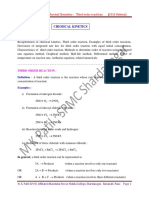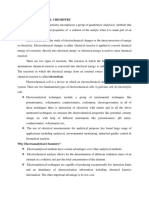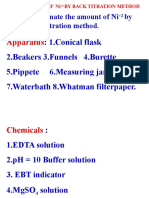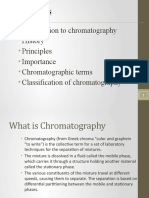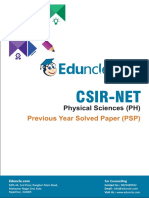78%(9)78% found this document useful (9 votes)
9K viewsMultiple Batch Extraction
The document discusses multiple batch extraction processes. It defines liquid-liquid extraction as a mass transfer operation used to separate components in a liquid solution by contacting it with an immiscible solvent. It describes how batch extraction works, including single and multiple stage batch extraction processes. The key aspects are that the aqueous feed is mixed with an organic solvent, the extract and raffinate phases are separated after equilibration, and multiple stage countercurrent extraction is most efficient for industrial scale metal extraction.
Uploaded by
Tuba AhmedCopyright
© © All Rights Reserved
Available Formats
Download as PPT, PDF, TXT or read online on Scribd
78%(9)78% found this document useful (9 votes)
9K viewsMultiple Batch Extraction
The document discusses multiple batch extraction processes. It defines liquid-liquid extraction as a mass transfer operation used to separate components in a liquid solution by contacting it with an immiscible solvent. It describes how batch extraction works, including single and multiple stage batch extraction processes. The key aspects are that the aqueous feed is mixed with an organic solvent, the extract and raffinate phases are separated after equilibration, and multiple stage countercurrent extraction is most efficient for industrial scale metal extraction.
Uploaded by
Tuba AhmedCopyright
© © All Rights Reserved
Available Formats
Download as PPT, PDF, TXT or read online on Scribd
You are on page 1/ 12
Multiple Batch Extraction
Prepared by: Tuba Ahmed
Definition of Extraction
•Liquid-Liquid extraction is a mass transfer
operation in which a liquid solution (the feed) is
contacted with an immiscible or nearly immiscible
liquid (solvent) that exhibits selectivity towards one
or more of the components in the liquid solution.
Purpose of Extraction
• To separate closed-boiling point mixture
• Mixture that cannot withstand high temperature of
distillation
• Example:
- recovery of penicillin from fermentation broth
solvent: butyl acetate
- recovery of acetic acid (b.p 1180c) from dilute
aqueous (b.p 1000c) solutions
solvent: ethyl-acetate
Solvent Extraction
Large volume of an
aqueous solution containing solute
Small volume of non-miscible organic solvent
• The solute originally present in the aqueous
phase gets distributed in both phases.
• If solute has preferential solubility in the organic
solvent, more solute would be present in the
organic phase at equilibrium
• The extraction is said to be more efficient
• Extract – the layer of solvent + extracted solute
• Raffinate – the layer from which solute has been
removed
• The distribution of solute between two phases is
express quantitatively by distribution coefficient,
KD.
solute concentration in extract phase
KD
solute concentration in raffinate phase
• Higher value of KD indicates higher extraction
efficiency.
Operating Modes of Extraction
• Batch or continuous extractions
• Batch extraction – single stage or multiple stage
• Continuous extraction – co-current or
countercurrent extraction
Batch Extraction
• The aqueous feed is mixed with the organic solvent
• After equilibration, the extract phase containing the
desired solute is separated out for further
processing.
• A schematic representation of a single batch
operation:
Feed Single stage Raffinate
Solvent extraction Extract
Batch Extraction in Multiple Stage
Schematic representation of a two-stage batch extraction
Multiple stage counter:
• For extraction of metals on industrial scale, multi
stage counter current solvent extraction process is
followed.
• The aqueous raffinate from one extraction unit is
feed to the next unit as the aqueous feed , while the
organic solvents flows in the opposite direction,
thereby picking up more metal ions in successive
contacts.
• Dividing the organic phase into small parts and
making multiple contacts is the most efficient way
of extracting.
Principles of Extraction
• Extraction of dilute solutions
• Extraction of concentrated solutions; phase
equilibria
You might also like
- Estimation of Ferric Ion and Ferrous Ion by Using75% (8)Estimation of Ferric Ion and Ferrous Ion by Using4 pages
- Chemical Kinetics Third Order Reactions TYBSC PHY Patil M K50% (2)Chemical Kinetics Third Order Reactions TYBSC PHY Patil M K16 pages
- (McGraw-Hill Series in Mechanical Engineering) W M Kays - M E Crawford-Convective Heat and Mass Transfer-McGraw-Hill (1993)100% (3)(McGraw-Hill Series in Mechanical Engineering) W M Kays - M E Crawford-Convective Heat and Mass Transfer-McGraw-Hill (1993)635 pages
- Basic Principles and Parameters For Industrial65% (17)Basic Principles and Parameters For Industrial5 pages
- Principle and Instrumentation of Coulometry76% (17)Principle and Instrumentation of Coulometry15 pages
- Determination of Iron Using Potassium DichromateNo ratings yetDetermination of Iron Using Potassium Dichromate2 pages
- Complexometry Determination of CR III and Iron III in A Mixture Kinetic Masking100% (7)Complexometry Determination of CR III and Iron III in A Mixture Kinetic Masking1 page
- Separation of Cations by Paper Chromatography100% (1)Separation of Cations by Paper Chromatography4 pages
- Determination of Barium From Barium Sulphate Gravimetrically100% (3)Determination of Barium From Barium Sulphate Gravimetrically2 pages
- Lecture Notes Localized Delocalized Bonds Hyperconjugation Inductive Effect Charge TransferNo ratings yetLecture Notes Localized Delocalized Bonds Hyperconjugation Inductive Effect Charge Transfer5 pages
- Estimation of Barium From Barium Sulphate Gravimetrically67% (15)Estimation of Barium From Barium Sulphate Gravimetrically4 pages
- MOT Inorganic: Dr. Sajjad Hussain Sumrra (CHEM-305) Chemistry-II100% (3)MOT Inorganic: Dr. Sajjad Hussain Sumrra (CHEM-305) Chemistry-II52 pages
- To Estimate The Amount of Ni by Using Back Titration Method100% (1)To Estimate The Amount of Ni by Using Back Titration Method15 pages
- Significance of Lipids in Biological Membranes and Transport Mechanisms100% (2)Significance of Lipids in Biological Membranes and Transport Mechanisms9 pages
- Organic Spectroscopy and Chromatography by M Younas Third EditionNo ratings yetOrganic Spectroscopy and Chromatography by M Younas Third Edition377 pages
- Presentation of Benzoic Acid From BenzamideNo ratings yetPresentation of Benzoic Acid From Benzamide18 pages
- Term Symbols & Spitting of Terms - Transition Metal Complexes100% (4)Term Symbols & Spitting of Terms - Transition Metal Complexes16 pages
- MOT of Coordination Compounds TYBsc Dhok Rajaram50% (2)MOT of Coordination Compounds TYBsc Dhok Rajaram11 pages
- Experiment 6: Preparation and Analysis of Potassium Trisoxalatoferrate (III) Trihydrate, K (Fe (C O) 3) .3H ONo ratings yetExperiment 6: Preparation and Analysis of Potassium Trisoxalatoferrate (III) Trihydrate, K (Fe (C O) 3) .3H O3 pages
- Table 1: Comparing Extraction and DistillationNo ratings yetTable 1: Comparing Extraction and Distillation23 pages
- Module 2 - Extraction Note - DR Akinsiku PDFNo ratings yetModule 2 - Extraction Note - DR Akinsiku PDF4 pages
- Liq-Liq & Solid-Liq Separation Notes - 3No ratings yetLiq-Liq & Solid-Liq Separation Notes - 311 pages
- Design and Control of Distillation Systems for Separating AzeotropesFrom EverandDesign and Control of Distillation Systems for Separating AzeotropesNo ratings yet
- Inorganic Reaction Mechanism: Prepared By: Ms - Sumina IbrahimNo ratings yetInorganic Reaction Mechanism: Prepared By: Ms - Sumina Ibrahim17 pages
- Questions Related To TLC and Paper Chromatogrphy (1) Miss IshratNo ratings yetQuestions Related To TLC and Paper Chromatogrphy (1) Miss Ishrat1 page
- Metal Nirosyl Infrared Spectroscopic StudyNo ratings yetMetal Nirosyl Infrared Spectroscopic Study5 pages
- Applications of High Performance Liquid Chromatography (HPLC) in To Inorganic and Organometallic CompoundsNo ratings yetApplications of High Performance Liquid Chromatography (HPLC) in To Inorganic and Organometallic Compounds16 pages
- Effect of Heat On Vitamin C in Tomatoes: Prepared By: Tuba Ahmed75% (4)Effect of Heat On Vitamin C in Tomatoes: Prepared By: Tuba Ahmed10 pages
- Valance Shell Electron Pair Repulsion Theory (Vsepr) : Prepared By: Tuba AhmedNo ratings yetValance Shell Electron Pair Repulsion Theory (Vsepr) : Prepared By: Tuba Ahmed18 pages
- Stoichiometry For Environmental Engineering0% (1)Stoichiometry For Environmental Engineering24 pages
- Properties of Granular Materials As Heat Transfer and Storage Medium in CSP ApplicationNo ratings yetProperties of Granular Materials As Heat Transfer and Storage Medium in CSP Application18 pages
- Dwnload Full Financial Analysis With Microsoft Excel 7th Edition Mayes Solutions Manual PDF97% (35)Dwnload Full Financial Analysis With Microsoft Excel 7th Edition Mayes Solutions Manual PDF35 pages
- NDA Bytes: Defence Career & Guidance AcademyNo ratings yetNDA Bytes: Defence Career & Guidance Academy11 pages
- Chemical Reaction Engineering-I: COURSE CODE:15CH1119 L T P C 3 0 0 3No ratings yetChemical Reaction Engineering-I: COURSE CODE:15CH1119 L T P C 3 0 0 32 pages
- Beamforming in Multi-Path Channels at 28 GHZ: Creating The Antenna ElementsNo ratings yetBeamforming in Multi-Path Channels at 28 GHZ: Creating The Antenna Elements7 pages
- Engine Performance Analysis of A Honda Test Engine With and Without Using Active I-VTEC SystemNo ratings yetEngine Performance Analysis of A Honda Test Engine With and Without Using Active I-VTEC System6 pages
- Biomechanics and Energetics of Uphill Cycling: A ReviewNo ratings yetBiomechanics and Energetics of Uphill Cycling: A Review13 pages
- Effects of Phosphate Modified and PregelatinizedNo ratings yetEffects of Phosphate Modified and Pregelatinized5 pages
- Physics 12c: Introduction To Statistical Mechanics: Course WebsiteNo ratings yetPhysics 12c: Introduction To Statistical Mechanics: Course Website146 pages
- Chemical Kinetics Third Order Reactions TYBSC PHY Patil M KChemical Kinetics Third Order Reactions TYBSC PHY Patil M K
- (McGraw-Hill Series in Mechanical Engineering) W M Kays - M E Crawford-Convective Heat and Mass Transfer-McGraw-Hill (1993)(McGraw-Hill Series in Mechanical Engineering) W M Kays - M E Crawford-Convective Heat and Mass Transfer-McGraw-Hill (1993)
- Complexometry Determination of CR III and Iron III in A Mixture Kinetic MaskingComplexometry Determination of CR III and Iron III in A Mixture Kinetic Masking
- Determination of Barium From Barium Sulphate GravimetricallyDetermination of Barium From Barium Sulphate Gravimetrically
- Lecture Notes Localized Delocalized Bonds Hyperconjugation Inductive Effect Charge TransferLecture Notes Localized Delocalized Bonds Hyperconjugation Inductive Effect Charge Transfer
- Estimation of Barium From Barium Sulphate GravimetricallyEstimation of Barium From Barium Sulphate Gravimetrically
- MOT Inorganic: Dr. Sajjad Hussain Sumrra (CHEM-305) Chemistry-IIMOT Inorganic: Dr. Sajjad Hussain Sumrra (CHEM-305) Chemistry-II
- To Estimate The Amount of Ni by Using Back Titration MethodTo Estimate The Amount of Ni by Using Back Titration Method
- Significance of Lipids in Biological Membranes and Transport MechanismsSignificance of Lipids in Biological Membranes and Transport Mechanisms
- Organic Spectroscopy and Chromatography by M Younas Third EditionOrganic Spectroscopy and Chromatography by M Younas Third Edition
- Term Symbols & Spitting of Terms - Transition Metal ComplexesTerm Symbols & Spitting of Terms - Transition Metal Complexes
- Experiment 6: Preparation and Analysis of Potassium Trisoxalatoferrate (III) Trihydrate, K (Fe (C O) 3) .3H OExperiment 6: Preparation and Analysis of Potassium Trisoxalatoferrate (III) Trihydrate, K (Fe (C O) 3) .3H O
- Design and Control of Distillation Systems for Separating AzeotropesFrom EverandDesign and Control of Distillation Systems for Separating Azeotropes
- Inorganic Reaction Mechanism: Prepared By: Ms - Sumina IbrahimInorganic Reaction Mechanism: Prepared By: Ms - Sumina Ibrahim
- Questions Related To TLC and Paper Chromatogrphy (1) Miss IshratQuestions Related To TLC and Paper Chromatogrphy (1) Miss Ishrat
- Applications of High Performance Liquid Chromatography (HPLC) in To Inorganic and Organometallic CompoundsApplications of High Performance Liquid Chromatography (HPLC) in To Inorganic and Organometallic Compounds
- Effect of Heat On Vitamin C in Tomatoes: Prepared By: Tuba AhmedEffect of Heat On Vitamin C in Tomatoes: Prepared By: Tuba Ahmed
- Valance Shell Electron Pair Repulsion Theory (Vsepr) : Prepared By: Tuba AhmedValance Shell Electron Pair Repulsion Theory (Vsepr) : Prepared By: Tuba Ahmed
- Properties of Granular Materials As Heat Transfer and Storage Medium in CSP ApplicationProperties of Granular Materials As Heat Transfer and Storage Medium in CSP Application
- Dwnload Full Financial Analysis With Microsoft Excel 7th Edition Mayes Solutions Manual PDFDwnload Full Financial Analysis With Microsoft Excel 7th Edition Mayes Solutions Manual PDF
- Chemical Reaction Engineering-I: COURSE CODE:15CH1119 L T P C 3 0 0 3Chemical Reaction Engineering-I: COURSE CODE:15CH1119 L T P C 3 0 0 3
- Beamforming in Multi-Path Channels at 28 GHZ: Creating The Antenna ElementsBeamforming in Multi-Path Channels at 28 GHZ: Creating The Antenna Elements
- Engine Performance Analysis of A Honda Test Engine With and Without Using Active I-VTEC SystemEngine Performance Analysis of A Honda Test Engine With and Without Using Active I-VTEC System
- Biomechanics and Energetics of Uphill Cycling: A ReviewBiomechanics and Energetics of Uphill Cycling: A Review
- Physics 12c: Introduction To Statistical Mechanics: Course WebsitePhysics 12c: Introduction To Statistical Mechanics: Course Website

